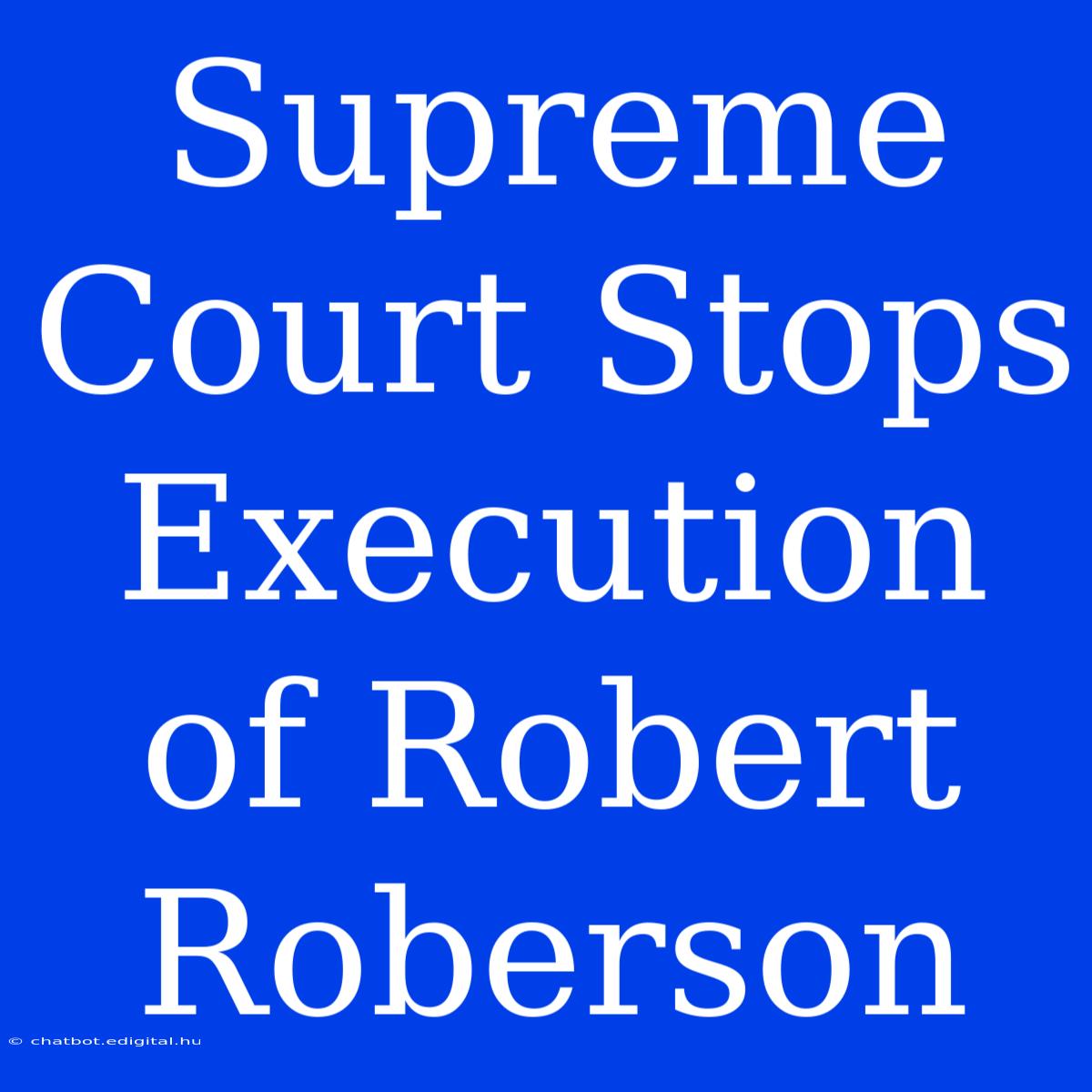Supreme Court Halts Execution of Robert Roberson: A Glimpse into Capital Punishment's Complexities
Can the death penalty be fairly administered, even in cases of heinous crimes? The Supreme Court's decision to halt the execution of Robert Roberson throws this question into sharp relief. This pivotal ruling raises crucial questions about the justice system, fairness, and the evolving nature of capital punishment in the United States.
Editor Note: The Supreme Court's decision to halt Robert Roberson's execution on [date of decision] highlights the ongoing debate surrounding capital punishment in America.
This case resonates with the public due to its complex legal and moral implications. It underscores the ongoing debate about the legitimacy of the death penalty, its application, and the potential for irreversible errors.
Analysis: This article delves into the key aspects of the Supreme Court's decision, analyzing the arguments presented by both sides, the legal precedents involved, and the potential implications for future cases. We explore the broader context of capital punishment in the United States, examining its history, current trends, and the ethical concerns that continue to fuel this debate.
Key Takeaways from the Supreme Court's Decision:
| Takeaway | Description |
|---|---|
| Stay of Execution | The Supreme Court issued a stay of execution pending further review, highlighting concerns about potential errors in the case. |
| Focus on Procedural Fairness | The decision focused on procedural fairness, raising questions about the adequacy of legal representation during the original trial. |
| Evolving Standards | The case reflects the evolving legal standards surrounding capital punishment, particularly regarding the requirement for competent legal representation. |
Supreme Court Stops Execution of Robert Roberson: Exploring the Key Aspects
The Case of Robert Roberson
The Supreme Court's decision to halt Robert Roberson's execution centered on his claim of ineffective legal representation during his original trial. Roberson was convicted and sentenced to death for the murder of a woman in [State of crime]. His legal team argued that his original attorneys failed to adequately investigate and present mitigating factors during the sentencing phase, potentially leading to an unfair outcome.
Procedural Fairness and Legal Representation
The Supreme Court's decision to stay Roberson's execution emphasizes the crucial role of procedural fairness in capital cases. The court scrutinized the arguments surrounding the effectiveness of legal representation, recognizing that competent legal counsel is essential for a fair trial and a just sentence.
- Role of Attorneys: Attorneys play a vital role in ensuring a fair trial, including the right to present mitigating evidence that might influence sentencing.
- Ineffective Assistance of Counsel: The concept of "ineffective assistance of counsel" refers to instances where an attorney's performance falls below the standards expected in legal practice, potentially impacting the outcome of the case.
- Impact on Sentencing: If the court finds evidence of ineffective legal representation, it may necessitate a review of the original trial and sentencing to ensure a just outcome.
Evolving Standards of Capital Punishment
The Supreme Court's decision also reflects the evolving standards governing capital punishment in the United States. The court continuously re-evaluates legal precedents and adapts to changing societal values and legal interpretations.
- Death Penalty Moratoriums: Several states have implemented moratoriums on executions, indicating a growing movement toward reconsidering the application of capital punishment.
- Public Opinion: Public opinion regarding the death penalty has shifted, with declining support for its use in recent years.
- Ethical Concerns: Ongoing ethical concerns about the potential for irreversible errors and the disproportionate impact on marginalized communities fuel the debate surrounding capital punishment.
FAQs About the Supreme Court's Decision
Q: What is the significance of the Supreme Court's decision to halt Roberson's execution? A: The decision underscores the court's commitment to procedural fairness in capital cases and reflects the ongoing legal and ethical debates surrounding the death penalty.
Q: What are the potential implications of this decision for future capital cases? A: The decision could lead to increased scrutiny of legal representation in death penalty cases and contribute to a broader reevaluation of the death penalty in the United States.
Q: What are the arguments for and against capital punishment? A: Supporters of the death penalty argue that it provides justice for victims and deters future crimes. Opponents contend that it is irreversible and carries a significant risk of executing innocent people.
Q: How does the Supreme Court's decision relate to broader debates about criminal justice reform? A: This case contributes to broader conversations about criminal justice reform, including issues of racial disparities, access to legal representation, and the need for fair and equitable treatment within the justice system.
Tips for Understanding the Supreme Court's Decision
- Research the Case: Familiarize yourself with the facts of the case, the legal arguments presented, and the Supreme Court's reasoning behind the decision.
- Explore Legal Precedents: Learn about relevant Supreme Court rulings on capital punishment and ineffective assistance of counsel.
- Engage with Opposing Views: Consider the arguments presented by both sides of the capital punishment debate to develop a nuanced understanding of this complex issue.
- Stay Informed: Keep up-to-date with legal developments and societal discussions related to the death penalty, its application, and its impact on the justice system.
Summary of the Supreme Court's Decision
The Supreme Court's decision to halt the execution of Robert Roberson reflects a crucial moment in the ongoing debate about capital punishment. The court's scrutiny of procedural fairness and the potential for ineffective legal representation underscore the complexity of this issue and highlight the evolving standards surrounding the application of the death penalty in the United States.
Closing Message
This case serves as a reminder of the gravity of capital punishment and the need for ongoing critical examination of its use. The Supreme Court's decision, along with the ongoing public discourse, encourages deeper reflection on the justice system's ability to ensure fairness, accuracy, and accountability in cases involving the ultimate penalty.

